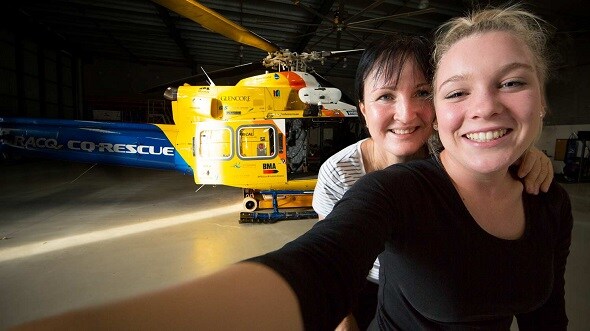05 julio 2018

Rosey Cameron was five years old when she was hit by a van in the tiny central Queensland town of Eaton.
She sustained multiple head injuries, had a heart attack by the side of the road, and when she took off in a rescue helicopter, no-one thought she would survive the trip.
But today, at the age of 16, she is a black belt in karate, has won gold at the highest level and continues to represent Australia internationally.
“I am very lucky because if it wasn’t for that helicopter I wouldn’t be here,” she said.
The helicopter that helped save Rosey’s life, is one of two, used by the RACQ, Central Queensland Rescue service.
BMA has been a long term supporter of the non-for profit rescue service based out of Mackay, Queensland, helping it to not only operate, but to grow. The service now has two helicopters that cover an area slightly bigger than Great Britain and in 2017 cost more than eight and a half million dollars to operate.
According to Leonie Hansen, the Service’s Relationship Manager, “A large part of our work is hospital transports for critically ill patients, but we also play a vital role in road or farm accidents, and conduct search and rescue off the coast.”
“There are numerous cases of people who were not expected to live, who have gone on to lead perfectly normal lives, thanks to our rescue service.”
Lisa Cameron, Rosey’s mother, knows first-hand how vital the service is.
“When Rosey took off in the helicopter I didn’t think she was ever coming back, and without the helicopter being there, she had zero chance of survival,” she said.
Luck, and being struck by a vehicle, are two things you wouldn’t normally associate together.
However, both Rosey and her mother acknowledge that on the day of the accident, luck was indeed on their side.
The chopper was already airborne after having completed a training mission and was very close to Rosey when the call came in.
It was also carrying, for the very first time, a critical care physician skilled in handling trauma victims.
“Her injuries were so bad that when we left the day of the accident, we didn’t walk through our front door again for 12 months,” said her mother.
A year after the accident Rosey continued to defy the odds.
Doctors said she could only attend school for a couple of hours a day, and that she must never play sport.
“My balance and coordination was pretty bad, so mum thought something like karate, with all its disciplined movement might help,” said Rosey.
Now a black belt, at age of 11, Rosey won gold and bronze in the World Karate Championships, which is the highest level of competition for karate.
“I love karate because it lets you compete, but it also teaches you a lot of discipline and respect, and you get to travel too!” she said.
“Before the service, people like Rosey just didn’t make it, because of the delays in terms of getting help to them,” said Leonie Hansen.
“Heart attack and stroke victims also benefit through quicker recovery because of the speed of the service.”
Leonie said the reason she loves coming to work every day is because she is part of a team that is literally saving lives.
